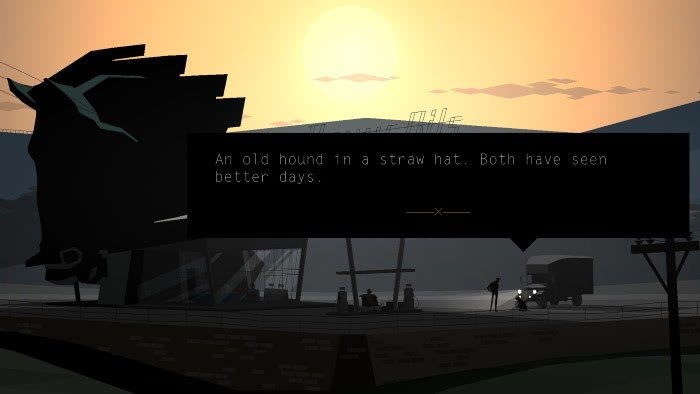‘Kentucky Route Zero’ Pays Off on Nine Years of Hope and Doubt

I bought Kentucky Route Zero years ago, played through the first act and loved it, but never went back to it. I always told myself I would, and the release of the fifth and final act last week was a good excuse to return. The above, by Austin Walker, is as good an essay/review on the game as you’re likely to find, but you’ll want to play at least until the end of Act IV before you read it. (And yes, I do recommend you play it if the aesthetic appeals. It is a weird and compelling story told in fascinating fashion.)
On twitter I saw someone say about Kentucky Route Zero, “What if the next great American novel wasn’t a novel?” And whilst I understand what they meant and even agree as so far as it goes, I also think it diminishes the role of the language of video games in helping craft the story of KR0. The final moment at the end of The Entertainment is so shocking because you’re the one turning your head to look. For all the reams of text contained within KR0, this isn’t a novel masquerading as a game, this is one of the best arguments yet made for video games as art (assuming that debate is still ongoing).
Which is a funny thing to say when I would also describe KR0 as less of a game, and more of an experience. Usually only RPGs have this much text, and this many dialogue choices, but as you play through KR0 you get the feeling that the choices you make don’t really matter. You can perhaps control the tone at times, and decide which character’s story you want to explore further, but ultimately the developers have a story to tell, and you are simply along for the ride. You become the mechanism by which the story can be told.
It’s at times melancholic, at times hopeful, obtuse, beautiful, Lynchian, touching, and on at least one occasion, tedious. It’s about people, and the ways we are used as fuel for the capitalist systems that dominate our society. But for every tragedy touched on in the story, there are also connections being forged, friends being made, family being found. The final act centres around the potential of a new community separate to the capitalist structures, and for that reason it feels important. Looking forward, more and more it seems like collective action and community engagement will be our best hope, and that’s where the game will guide you, if you let it. Also, in the last act you play as a cat and you get to meow at people. What’s not to love?